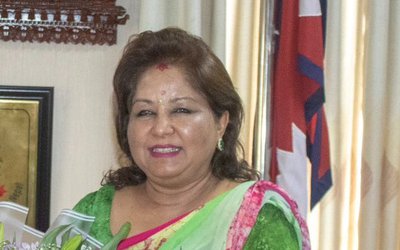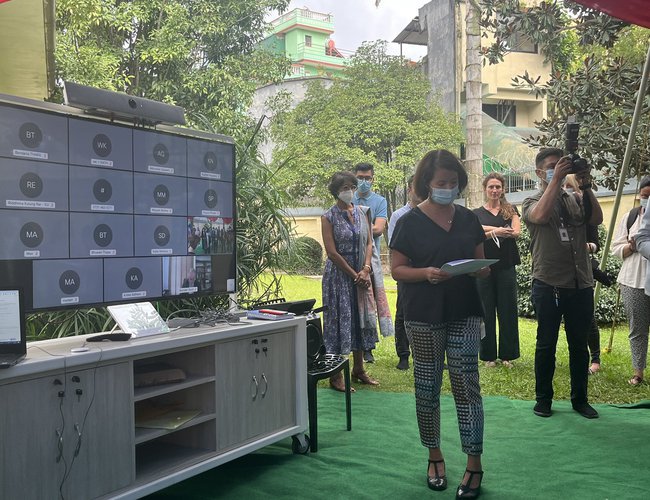
Scores of young and enthusiastic men and women were gathered at the backyard garden of the Delegation of the European Union to Nepal in Lazimpat on August 4 to attend a Pre-Departure Orientation (PDO).
Organized by the Delegation of the European Union to Nepal together with the Erasmus Mundus Association Nepal, the best among the Nepali youth, they had been selected from various fields in an open competition, joined a Pre-Departure Orientation (PDO) for the new scholarship recipients of Erasmus Mundus Joint Master Degree (EMJMD) batch 2022-2024.
This year 60 Nepali students have received the scholarship, which is higher compared to last year when 49 students were awarded. The students have been awarded full scholarships for the period 2022-2024 and they will spend two years fulltime in prestigious European Universities to pursue their Master's Degrees in various fields. Some of the fields of studies for which the students have been awarded are soils and global change, flood risk management, urban climate and sustainability, forestry and natural resources management, media and communication and vaccinology education.
All the subjects go well with Nepal’s needs for trained human resources. The fresh awardees got useful tips and advice for living and studying in Europe during the pre-departure orientation organized at the EU Delegation to Nepal office.
Countries in South Asia rank high in terms of number of scholarships received every year. When comparing the number of Erasmus scholarships awarded to the region, Nepal ranks fourth in South Asia and is among top 20 among all regions.
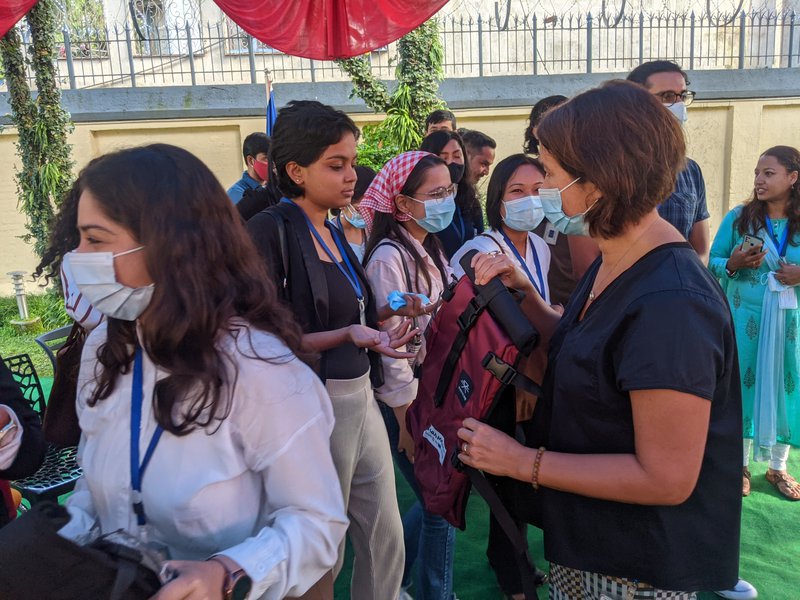
The Erasmus Scholarships cover all expenses, including tuition fees, a living allowance, and travel and installation costs.
Orientation Programs
Mingling with the young Nepali students, talking about various aspects of the courses, life and society of Europe, Nona Deprez, ambassador of European Union to Nepal, was helping the youth to prepare for their two years in European Universities.
This was not the first time ambassador Nona Deprez was inspiring and encouraging young Nepalese. The ambassador has been giving high priority to the youth of Nepal.
For 60 Nepalese young Erasmus + scholarships awardees, interacting with Nona Deprez, ambassador of European Union to Nepal, was highly inspirational. In her half an hour orientation lecture, Deprez explained many things about of the courses.
As over 40 percent population of Nepal are in the age between 15-39, educating and supporting youth is the best way to invest in the prosperous future as education is the first major investment for many young adults to improve their ability to secure access in different sector.
European Union has been a major development partner of Nepal in providing much needed support to Nepal government’s priority sector to educate Nepal’s youth and enhance their capacity and capability.
“I am so inspired by their words and their enthusiasm. They are the future leaders of Nepal. It is great to see them here with courage to go and study abroad. The journey they are going will be an adventure to learn and meet many new people, food and other experiences. I told them how to come out of their journey and come back with those skills and knowledge and memories for the sustainable development of Nepal. We are very proud to say that this year we have 60 students from Nepal which is really a lot in terms of size. There are 120 students from India. It is wonderful and I would like to have even more next year.”
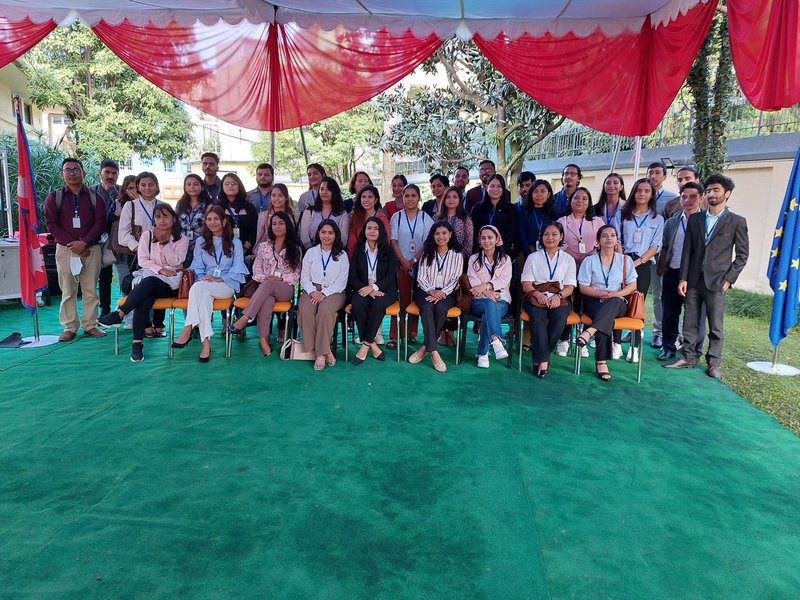
The average age of the students is 25. Once they come back, these students will work in different sectors -- some of them will work in hospitals, agriculture, climate change, education and so on.
EU The Largest Global Donor In Education
The European Union is the largest global donor in education with its Erasmus+ program (2021-2027) budgeted at EUR 26.2 billion. This is nearly double the funding compared to its predecessor program (2014-2020).
The year 2022 marks the 35th year of existence of Erasmus+, the EU's flagship program for education, training, youth and sport. The 2021-2027 program places a strong focus on social inclusion, the green and digital transitions, and promoting young people’s participation in democratic life.
For 35 years, the EU has funded the Erasmus program, which has enabled students, staff, trainees, teachers, volunteers and more to spend part of their studies at another higher education institution or with an organization in Europe and beyond.
In addition to individual opportunity, Erasmus+ provides the opportunity for organizations from eligible Partner Countries, mainly higher education institutions (HEIs). It supports the modernization, accessibility, and internationalization of higher education in Partner Countries.
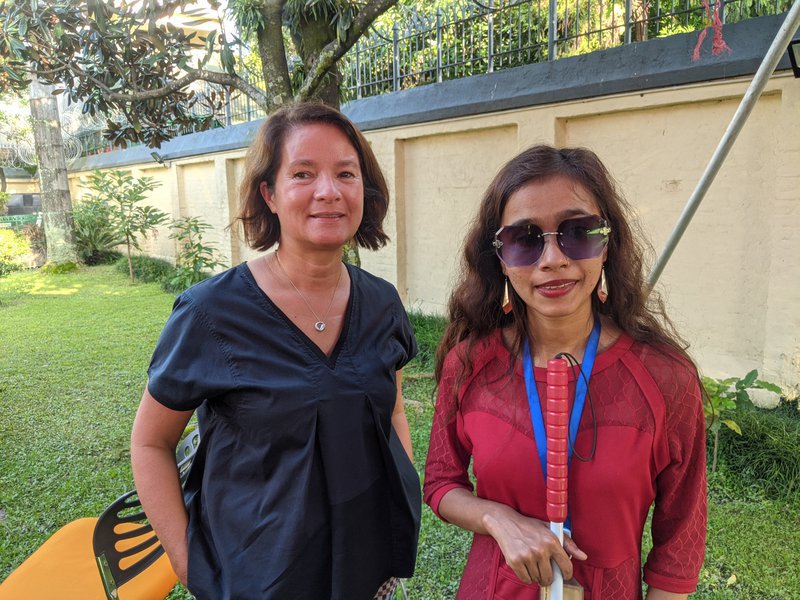
Capacity-building projects in the field of higher education are transnational cooperation projects, based on multilateral partnerships, primarily between higher education institutions from EU Member states or countries associated to the Program and third countries not associated to the Program.
Voices of Awardees
Namrata Bhusal, 24, who is pursuing course in natural forest and forest resources management in Europe’s top university, expressed the hope that she will come back with the knowledge and skill to help Nepal. “I worked in Udayapur in Plantation division and my next job was in Plantation related organization. A graduate of Forest Institute of Hetauda under Agriculture and Forest University, going to Europe for master’s study is a great achievement of my life,” said Bhusal.
“The statement given by ambassador touched me and inspired me to do hard work and come back with the knowledge that will support Nepal. I agree with ambassador that we are among a few Nepalese young to get this kind opportunity to pursue study in world’s renowned universities in Europe. As I am leaving for the study, I have to utilize coming two years to enhance my knowledge to improve the situation in natural resource management back home.”
A resident of Rupandedhi district of Lumbini province, Bhusal considers this is a great scholarship allowing fresh young graduate from Nepal to have exposure to world class students.
Biswas Chepang, who completed a course in 2016-018 batches, said the courses will be rigorous. Having completed his master’s degree in social work, Chepang is currently working in WWF-Nepal. Chepang said that higher education in Europe and degree has changed his overall performance.
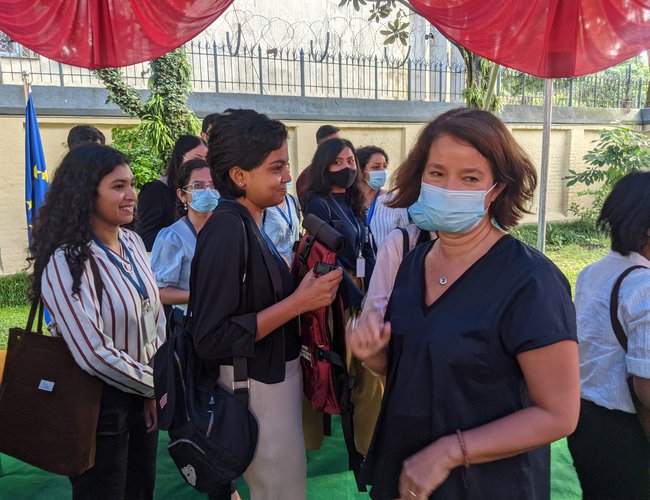
Not only the fresh graduates, some awardees had a long experience of working in the sector as well. Manisha Pantha, 33, born in Butwal of Rupandehi district of Lumbini Province is one of them. Having completed her graduation in nursing and currently working in National Society for Earthquake Technology (NSET), Panthi feels very enthusiastic now to pursue higher education. “I am going to pursue my master in Public health and disaster. My background is blended in public health and disaster; I think this will be a great course for me. I am very happy to be selected in a course I have been trying to pursue. I am going to Spain, Sweden and Cyprus.
“I have been working in NSET for the last 10 years. I am still an NSET employee. The ambassador gave us a good guidance boosting our confidence when we all were nervous how to cope with the new situation. Nepal has a very few persons to have specialized in public health and disaster. I have been providing training to Nepal Police and armed police force on disaster and public health. I have been regularly taking class for security officials from Nepal, India, Bangladesh and Pakistan on importance of public health in rescue and rehabilitation.
Sabina Poudel, 25, a resident of Gaindakot of Gandaki Province. Having completed BSc agriculture from Lamjung Agriculture College in 2019, I worked for two years in KOICA as agriculture officer and I worked in sustainable agriculture. I am happy to have got the departure orientation.
Bidhya Bhandari, 24, is a resident of Kathmandu and graduate of agriculture from Rampur. After graduation, I joined an NGO as research assistant. Sustainable agriculture, new technology and food production is my area. I want to work in full commitment in the field. This is a new program.
“There is need to have a right set of mind. It is a process. I was selected. I was very happy. I would like to thank EU from the bottom of my heart and mind. I want to work.”
Yuri Shakya, 25, a resident of Patan, is a graduate of centenary sciences. Shakya is pursuing her master’s in veterinary. She is not going for genetic science.
For some Alumnae of the course, the master’s degree from Europe has brought everything. Sumeera Shrestha, who pursued the course in 2010/012, is one of them. She just left the job as chief executive officer at Women for Human Rights, an NGO working in the issues related to single women. Shameera had learned how to vigorously work.
“I worked there for almost 10 years. What I am today is the higher education that I took in the Poland Warsaw. It was an intensive course that provided wide exposure to Nepalese students. Resident of Kathmandu district, Shameera is now working as researcher and consultant.”
Having returned just a few months back, Pranayan Kumar Dhakal, 26, who was selected in 2020/022 to pursue courses in Italy, UK and Portugal on sustainable transportation and power system, said that this is the course which helped him to have a new vision of the world.
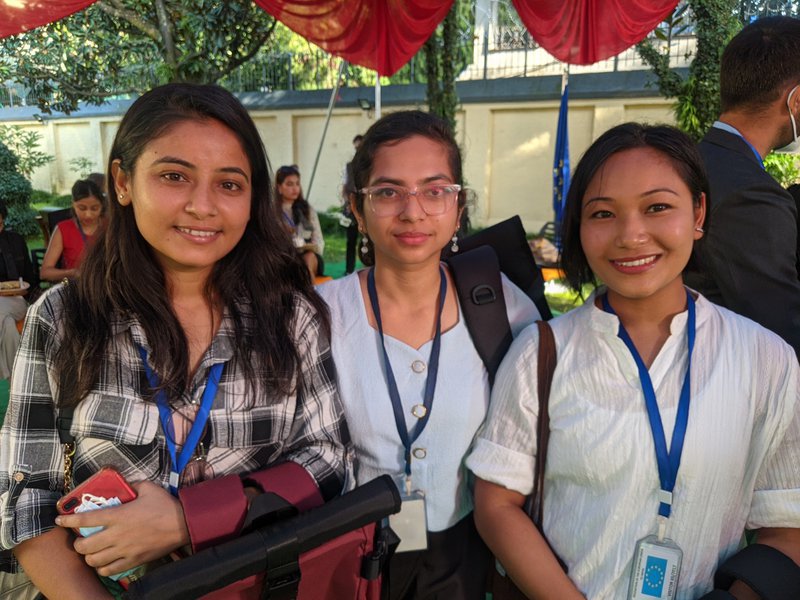
Shristi KC, 26, a visually impaired person, pursued the course two years ago in Europe. “I am proud as the fellow of the course. This helped me a lot to enhance my skills and knowledge. This is an inclusive program which accommodates all the people, including people with disability, LGBT and others,” said KC.
Nepalese in Erasmus + scholarships
Nepalese Higher Education Institutions, in partnership with European Universities, are implementing 14 capacity-building projects in the field of higher education. Tribhuwan University, Kathmandu University, Pokhara University, Mid-Western University are some of the Nepalese partners working in the area of engineering, sustainable tourism, smart agriculture and more.
Welcoming the awardees, EU Ambassador to Nepal, Nona Deprez, said: “I am indeed more than happy to see that the number of Nepali students winning the Erasmus Scholarship is growing every year. Last year, 49 students received the scholarship, and this year sixty students have proved their excellence and have won this scholarship. Erasmus is a generous but competitive worldwide scholarship programme, the best ones win. I would like to see the number of Nepali awardees grow every year.”
Ambassador Deprez highlighted that the people to people exchange between the EU and Nepal will go a long way in building common understanding on issues of common concern.
“We hope that these scholarships will help these students to further excel and that they will return to Nepal with enhanced skills and knowledge useful for the country and themselves, as well as with fond memories of Europe," Ambassador Deprez said.
More than 800 Nepalese students have benefitted from the EU’s Erasmus+ Scholarship Programme so far. The Erasmus+ scholarships also provide opportunities for Europeans to undertake short-term studies and teaching in various universities across Nepal.
One Erasmus+ Nepal awardees, Sunu Lama, who will undertake her Master’s level studies in Estonia, said, “Erasmus Mundus tag itself is a big yes to an incredible experience for me and signing up for it is like a dream come true. It is truly a stepping stone for one’s professional and personal growth.”
Another Erasmus+ Nepal awardee Abhushan Gautam Shakya who will be going to Denmark for his first year studies on ‘Media and Globalization said, “The Erasmus Mundus scholarship has provided an excellent opportunity for media and communications professionals like me to explore innovative partnerships related to media programming with journalists from around the world. The insights gained during my study will enable me to take a research based approach on media programming and produce effective and actionable content on emerging issues that are close to my heart including disaster preparedness and climate change adaptation.” Shakya will be taking up his second year studies in UK.
Niranjan Khadka, Country Representative of Erasmus Mundus Association-Nepal, who completed his Master’s from Denmark and Italy (2013-2015) said, “Erasmus Nepal family is growing each year, many congratulations to this year’s awardees. The EMA Nepal is working to share scholarship information and support prospective students to prepare so that they can participate in the program from every corner of the country”.
Representatives of the EU Member State Embassies based in Kathmandu and New Delhi also participated in the programme and answered the queries of the students who are looking forward to begin their studies in different countries in Europe.
In addition to the Erasmus+ scholarships, the EU Delegation in Nepal has been providing ongoing support to the Government of Nepal/Ministry of Education, Science and Technology on Quality Education and Technical and Vocational Training.
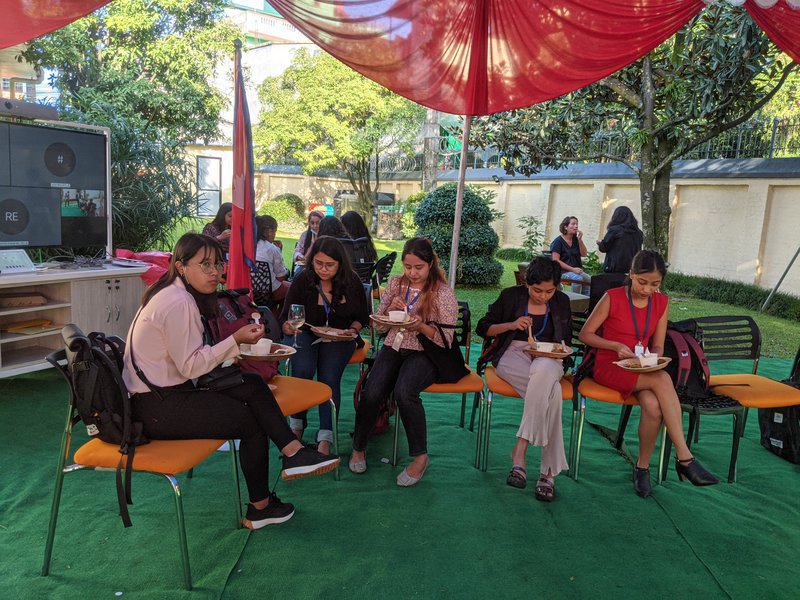
Education has been a key component of the EU's financial assistance to Nepal since the late 1990s through the provision of sector budget support. The EU along with other donors supported the Government of Nepal to complete the School Sector Reform Programme (SSRP-2009-2016) and currently it has been supporting the School Sector Development Plan (SSDP), which aims at guiding the reform efforts of the government until 2023 in line with Nepal’s vision to graduate from least developed country status. Education is one of the major pillars of development cooperation for EU’s ongoing multiannual indicative programme (2021-2027) for Nepal.
Similarly, the EU support in TVET reform entails strengthening and more effectively implementing a TVET policy responsive to labour market needs, as well as piloting and integrating the Public Private Partnership (PPP) approach in three key economic sectors: agriculture, construction, and hospitality and tourism, in order to offer opportunities for promoting the transition to a greener, climate-resilient and low-emission economy. The TVET-PP is going forward to help reduce youth unemployment by improving access to relevant and high-quality TVET, which will increase their employability and provide them with better economic opportunities in the future.
As Greek political thinker Plato says the direction in which education starts a man will determine his future life. In this sense, investment in young’s education always pays the best interest of society and the country. EU’s support to Nepal in education has already started to give results.
- FOREIGN EXCHANGE: Largest Deposit
- Jul 22, 2024
- IMF: Approval Of SDR
- Jul 22, 2024
- NEPAL-KOREA RELATIONS: Fifty-Years Of Warm Relations
- May 31, 2024
- NEPAL-BRITAIN: Centenary Celebration
- May 31, 2024
- POLITCS: Forming New Alliances
- May 27, 2024






